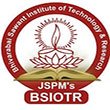JSPM's Bhivarabai Sawant Institute of Technology & Research, Wagholi, Pune
Gate No. 720/2, Nagar Road, Wagholi, Pune, Maharashtra 412207
Approved By AICTE, New Delhi, Govt.Of Maharashtra & Affiliated To Savitribai Phule Pune University
Institute is Accredited by National Assessment & Accreditation Council(NAAC), Bengaluru with A+ Grade
and Electronics & Telecommunication, Electrical Engineering and Information Technology(IT) are accredited by National Board of Accreditation(NBA), New Delhi
Engineering Science
" The Department of General Science of BSIOTR is established in the year 2009 and is growing with flourishing computing facilities and dedicated faculty. The goal of the department is to nurture the students by polishing their talents so as to cultivate competency, responsibilities, and highly rewarding careers in IT profession and to portrait them as responsible citizens. To fulfill this goal our department has exceptionally motivated, dedicated, highly qualified faculty. The Department is also blessed good infrastructure in order to cope up with the changing needs of technical environment. To bridge the gap between the academics and Industry requirements, the Department has good synchronization with industry experts, which give timely guidance to the students for meeting the future expectations of the industry by enriching their lives for better career. "
Vision
To satisfy the aspiration of youth force, who wants to lead nation towards prosperity through techno-economic development
Mission
To provide, nurture and maintain an environment of high academic excellence, research and entrepreneurship for all aspiring students, which will prepare them to face global challenges maintaining high ethical and moral standards.
Program Outcomes (PO)

PO1.Engineering Knowledge: Apply the knowledge of mathematics, science, engineering fundamentals, and an engineering specialization to the solution of complex engineering problems.
PO2.Problem Analysis: Identify, formulate, review research literature, and analyze complex engineering problems reaching substantiated conclusions using first principles of mathematics, natural sciences, and engineering sciences.
PO3.Design & Development: Design solutions for complex engineering problems and design system components or processes that meet the specified needs with appropriate consideration for the public health and safety, and the cultural, societal, and environmental considerations
PO 4. Investigations of Problems: Use research-based knowledge and research methods including design of experiments, analysis and interpretation of data, and synthesis of the information to provide valid conclusions.
PO 5.Modern Tool Usage: Create, select, and apply appropriate techniques, resources, and modern engineering and IT tools including prediction and modeling to complex engineering activities with an understanding of the limitations.
PO 6.The Engineer and Society: Apply reasoning informed by the contextual knowledge to assess societal, health, safety, legal and cultural issues and the consequent responsibilities relevant to the professional engineering practice.
PO 7.Environment and Sustainability: Understand the impact of the professional engineering solutions in societal and environmental contexts, and demonstrate the knowledge of, and need for sustainable development.
PO 8.Ethics: Apply ethical principles and commit to professional ethics and responsibilities and norms of the engineering practice.
PO 9.Individual and Team Work: Function effectively as an individual, and as a member or leader in diverse teams, and in multidisciplinary settings.
PO 10.Communication: Communicate effectively on complex engineering activities with the engineering community and with society at large, such as, being able to comprehend and write effective reports and design documentation, make effective presentations, and give and receive clear instructions.
PO 11.Project Management and Finance: Demonstrate knowledge and understanding of the engineering and management principles and apply these to one’s own work, as a member and leader in a team, to manage projects and in multidisciplinary environments.
PO 12.Life-long Learning: Recognize the need for, and have the preparation and ability to engage in independent and lifelong learning in the broadest context of technological change.
Mrs. Nilima Jagtap
Assistant Professor M Sc. Organic Chemistry, MBA(HR), Ph.D. Pursuing
nilimabsiotr@gmail.com
Vision
- To create an inclusive, friendly environment and build a strong ITSA community where all students can find their place to develop their curricular and co-curricular skills and participate in extracurricular.
Mission
- To bring together all the students affiliated with information technology and lead them to both professional and academic success
Objective
- To build the trust that each student is unique and deserves a comprehensive system of support services that will assist in meeting their educational and personal goals.
Engineering Science Student Association
| Sr.No. | Name of Committee Members | Designation |
|---|---|---|
| 1 | Nilima Jagtap | Co-ordinator |
| 2 | Tanisha Kadam | President |
| 3 | Sudharshan Pagar | Vice President |
| 4 | Harshada Kodulkar | Secretary |
| 5 | Aniket Mundhe | Treasure |
| 6 | Rutuja Jadhav | Cultural |
| 7 | Siddhi Shinde | Decoration |
| 8 | Kalpesh Patil | Sport |
| 9 | Shruti Debadhwar | Food |
| 10 | Nishant Sapkal | Photography |
| 11 | Vaishnavi Khade | Member |
| 12 | Prashant Gaikwad | Member |
| 13 | Shraddha Nimbalkar | Member |
| 14 | Yash Gadge | Member |
| 15 | Kuntal Zambre | Member |
| 16 | Rohan Londhe | Member |
| 17 | Sancheti Pawase | Member |
| 18 | Akash Kuwar | Member |
| 19 | Esha Edhate | Member |

.png)










ENGINEERING CHEMISTRY LABORATORY
The Engineering Chemistry Lab offers practical exposure to water quality analysis, electrochemistry, polymer synthesis, and mat ...
Read MoreENGINEERING PHYSICS LABORATORY
The purpose of the Engineering Physics lab is to provide a practical understanding of fundamental physics concepts that are ess ...
Read MoreBASIC ELECTRONICS LABORATORY
The purpose of a basic electronics laboratory is to provide students or learners with hands-on experience to understand and app ...
Read MoreBASIC ELECTRICAL ENGINEERING LABORATORY
The primary purpose of a basic electrical engineering lab is to provide students with hands-on experience to reinforce the ...
Read More